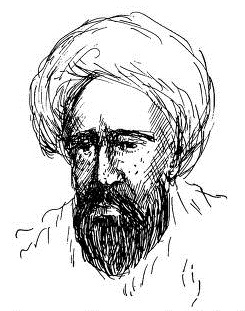Buhturi facts for kids
Quick facts for kids
Buhturi
Al-Walīd ibn Ubaidillah Al-Buḥturī
أبو الوليد بن عبيدالله البحتري التنوخي |
|
|---|---|

A 1967 sketch is poet Buhturi by unknown artist from the book "Min Oyun al-Shi'r"by Naji al-Qashtini
|
|
| Born | 821 Manbij, Bilad al-Sham, Abbasid Caliphate (now Syria) |
| Died | 897 Manbij, Abbasid Caliphate |
| Resting place | Manbij |
| Pen name | Al-Buhturi |
| Occupation | Arabic Poet |
| Language | Arabic |
| Nationality | Caliphate |
| Period | Islamic Golden Age (Abbasid era) |
Al-Walīd ibn Ubaidillah Al-Buḥturī (Arabic: أبو الوليد بن عبيدالله البحتري التنوخي, romanized: al-Walīd ibn `Ubayd Allāh al-Buhturī), often called Al-Buhturi, was a very famous Arab poet. He lived from 821 to 897 AD. He was born in a city called Manbij, which is now in Syria. This area was part of Islamic Syria back then.
Al-Buhturi belonged to the Tayy tribe, just like another well-known poet, Abu Tammam.
Biography
When Al-Buhturi was young, he met the poet Abu Tammam in a city called Homs. Abu Tammam was impressed by Al-Buhturi's talent. Because of Abu Tammam's recommendation, Al-Buhturi received a yearly payment of 4000 dirhams from the local leaders. A dirham was a type of money used a long time ago.
Later, Al-Buhturi moved to Baghdad, which was a very important city. There, he wrote poems praising the caliph al-Mutawakkil. A caliph was the ruler of the Islamic empire. He also wrote poems for other important people in the caliph's court.
Even though he lived in Baghdad for a long time, Al-Buhturi often wrote poems about his love for Aleppo. He also wrote love poems for a girl named Aiwa from that city. Al-Buhturi passed away in his hometown of Manbij in 897 AD.
His Poetry
Al-Buhturi's collected poems are known as a dīwan. His dīwan was put together and published twice in the 10th century.
One of the people who organized his poems was Abu Bakr bin Yahya al-Suli. He included Al-Buhturi's work in his book Kitāb Al-Awrāq. Another editor later arranged Al-Buhturi's dīwan by topic.
Like Abu Tammam, Al-Buhturi also created a collection of older poems. This collection is known as the Hamasah. These collections of poems are also called Diwans.
See also
In Spanish: Buhturi para niños
 | Janet Taylor Pickett |
 | Synthia Saint James |
 | Howardena Pindell |
 | Faith Ringgold |

